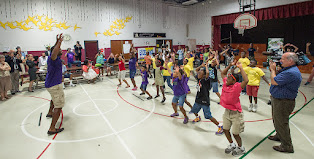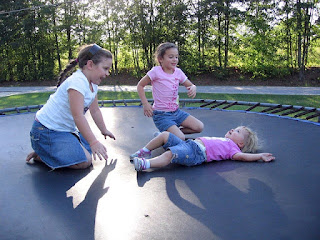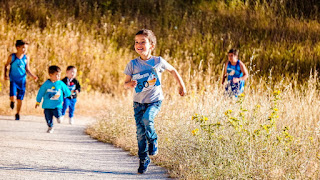Physical activity is important for children and adolescents because it helps them maintain a healthy weight, build strong muscles and bones, and improve their mental health and overall well-being. It can also help reduce the risk of developing chronic conditions such as obesity, type 2 diabetes, and heart disease.
Benefits of physical activity for children
There are many benefits of physical activity for children and adolescents, including:
1. Maintaining a healthy weight: Physical activity can help children and adolescents maintain a healthy weight by burning calories and increasing muscle mass.
2. Building strong muscles and bones: Regular physical activity can help kids build strong muscles and bones, which can help reduce the risk of developing osteoporosis later in life.
3. Improving mental health: Physical activity can improve children's mood and reduce feelings of stress, anxiety, and depression.
4. Enhancing cognitive function: Studies have shown that physical activity can improve children's cognitive function, including their memory, concentration, and problem-solving skills.
5. Reducing the risk of chronic diseases: Regular physical activity can help reduce the risk of developing chronic conditions such as obesity, type 2 diabetes, and heart disease.
6. Promoting social interaction: Physical activity can provide an opportunity for children to socialize and interact with their peers, which can help improve their social skills and self-esteem.
7. Improving sleep: Children who are physically active tend to sleep better, which can improve their overall well-being.
There are many ways for kids to be physically active, including participating in organized sports, playing active games, going on walks or bike rides, and doing activities around the house or yard such as dancing, running, or playing tag.
It is recommended that children and adolescents engage in at least 60 minutes physical activity per day. This can be accumulated through shorter periods of activity throughout the day. It is also important for kids to incorporate strength training and flexibility exercises into their routine to help develop healthy muscle and bone mass and improve their overall physical fitness.
It is important for parents and caregivers to encourage and support their children's participation in physical activity and to model healthy behaviors themselves. Children who are physically active tend to have better grades, sleep better, and have a more positive outlook on life.
Moreover, there is a strong relationship between physical exercise and mental health in children and adolescents. Regular physical activity has been shown to have a positive effect on children's mental health and well-being, and can help reduce the risk of developing mental health conditions such as depression and anxiety.
Physical activity can improve children's mood and reduce feelings of stress and anxiety by releasing endorphins, which are chemicals in the brain that can produce feelings of pleasure and happiness. It can also help improve self-esteem and confidence, as children may feel a sense of accomplishment and pride when they see their physical abilities improve.
In addition to these psychological benefits, physical activity can also have a positive impact on brain function, including memory, concentration, and problem-solving skills.
Adverse Effects of being Physically In-active
Non-physical activities, such as sedentary behaviors such as watching television or using a computer or phone for long periods of time, can have negative effects on children's physical health and well-being.
Prolonged sedentary behavior has been linked to an increased risk of obesity and other chronic health conditions, such as type 2 diabetes and heart disease. It can also lead to poor muscle and bone health, as children are not engaging in activities that promote muscle and bone development.
In addition to the physical effects, non-physical activities can also have negative effects on children's mental health and cognitive development. Excessive screen time has been linked to an increased risk of attention problems, sleep disturbances, and social isolation.
It is important for children and adolescents to balance their non-physical activities with physical activity and to limit their screen time. The American Academy of Pediatrics recommends that children and adolescents limit their screen time to no more than two hours per day and to engage in at least 60 minutes of moderate-to-vigorous intensity physical activity per day.
Best Physical Exercises of Kids
There are many physical exercises that are suitable for children and adolescents. It is important for kids to participate in a variety of physical activities to develop their overall physical fitness and to keep things interesting. Some examples of physical exercises for kids include:
1. Running: Running is a great cardiovascular exercise that can improve endurance and leg strength. It can be done outside or on a treadmill.
2. Swimming: Swimming is a low-impact exercise that can improve cardiovascular endurance, flexibility, and strength. It is also a great way for kids to cool off during hot weather.
3. Biking: Biking is a fun way for kids to get outside and get some exercise. It can improve leg strength and cardiovascular endurance.
4. Jumping rope: Jumping rope is a fun, high-intensity exercise that can improve coordination, endurance, and leg strength.
5. Dancing: Dancing is a fun way for kids to get moving and have fun. It can improve coordination, balance, and cardiovascular endurance.
6. Yoga: Yoga is a great way for kids to improve flexibility, balance, and relaxation. It can also help improve focus and concentration.
7. Team sports: Team sports such as soccer, basketball, and football can improve coordination, teamwork, and cardiovascular endurance.
8. Strength training: Strength training exercises such as push-ups, squats, and lunges can help kids build muscle strength and improve bone density.
It is important for kids to be physically active every day and to find activities that they enjoy. Encouraging children to participate in a variety of physical activities can help them develop a lifelong love of physical activity.


.jpeg)

.jpg)